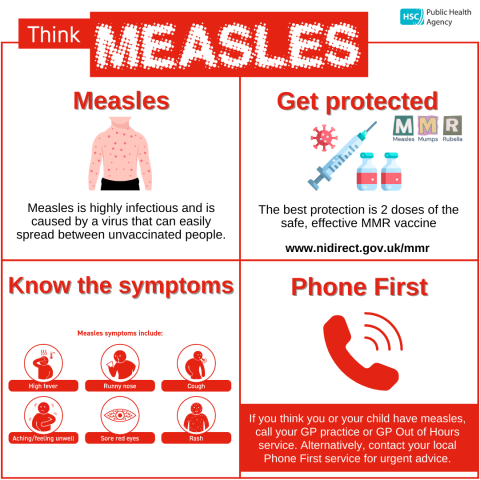Reminder to check children have their MMR vaccine as Northern Ireland sees increase in measles cases

The Public Health Agency (PHA) is emphasising the importance of getting the MMR (measles, mumps and rubella) vaccine as it confirmed that a number of linked cases of measles have been identified in the Southern Health and Social Care Trust area.
This brings the total cases of measles in Northern Ireland to 10 laboratory confirmed cases.
Louise Flanagan, Consultant in Public Health at the PHA, said: “Measles is highly infectious and is caused by a virus that can easily spread between unvaccinated people, which is what has happened here. This cluster impacts two schools, which thankfully have fairly high MMR uptake rates, so disruption to the school community has been lessened. However, this is a timely reminder to parents about the importance of the MMR vaccine in helping to protect your children and preventing against this highly infectious and serious disease.
“Measles can be unpleasant and will usually clear in about seven to 10 days without causing any further problems, unfortunately, for some individuals, measles can lead to serious and potentially life-threatening complications. It used to be very common in children, but following the introduction of the MMR vaccine, cases became rare, with no confirmed cases in Northern Ireland in the last seven years until recently. Two doses of the MMR vaccine help provide the best protection against these diseases.”
As measles is very infectious it is important that anyone with suspected measles avoids any situation where they can spread the disease, such as a GP’s waiting room or an emergency department. People should phone in advance and get advice rather than turning up to a healthcare setting, except in an emergency.
The initial symptoms of measles can include:
- a high temperature (fever);
- a runny or blocked nose;
- sneezing;
- a cough;
- sore, red eyes that may be sensitive to light;
- a few days later, a red-brown blotchy rash will appear. This may start on the head or upper neck, before spreading outwards to the rest of the body.
Most childhood rashes are not measles but you should consult your GP without delay if:
- you suspect it is measles;
- symptoms worsen;
- temperature increases to above 38°C;
- temperature stays high after other symptoms have gone.
Louise Flanagan continued: “The identification of additional measles cases in Northern Ireland is not unexpected, as we have seen a significant rise in cases in England and across Europe. In order to help prevent serious illness and outbreaks, it is vital that those who have not had their two doses of the MMR vaccine act now and help reduce the risks from this highly contagious and potentially deadly disease.
“We have seen a fall in the numbers of children receiving the MMR vaccines and these children are now at risk. It is therefore important that unvaccinated children and young adults get any missed MMR vaccines as soon as possible.
“If you are unsure if your child has received their two doses of the MMR vaccine, check their ‘red book’ or contact your GP practice to find out.”
For information on the MMR vaccination see www.nidirect.gov.uk/mmr
For further information on measles see www.nidirect.gov.uk/conditions/measles
- The PHA has notified the schools involved and has contacted the parents and guardians of children who may have been exposed, advising them of the situation and of the need to remain aware of the signs and symptoms of measles and of the importance of rapidly protecting unvaccinated individuals with the MMR (measles, mumps and rubella) vaccine.
- Within a school setting unvaccinated individuals are at risk of contracting measles and, if identified as a close contact of someone with measles they may be asked to self-isolate for up to 21 days.
- Due to patient confidentiality no further comment will be given on any confirmed case.
- Confirmed measles cases are notified to the Public Health Agency and recorded at www.pha.site/MeaslesData. The report is updated every Thursday.
- Prior to 2024 the last confirmed case of measles in Northern Ireland was in 2017.
